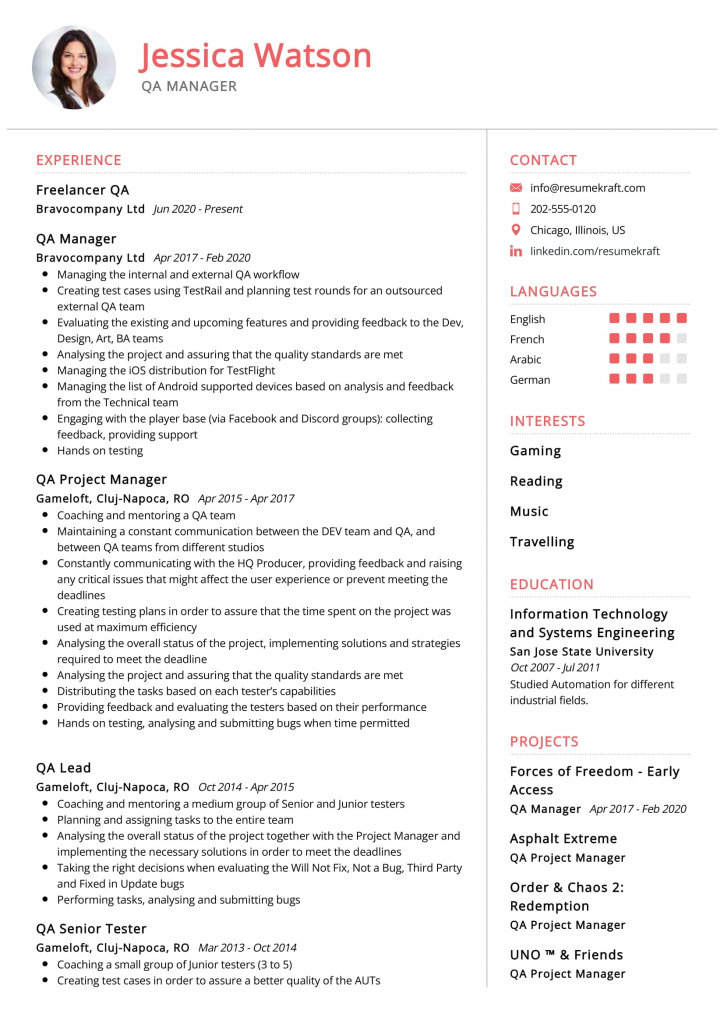
When crafting your QA Manager resume, be sure to focus on highlighting the skills that will make you the best candidate for the job. Prospective employers will be looking for someone who can effectively identify and solve problems, so be sure to showcase your problem-solving abilities. Tell readers what to expect from your blog post and promise to provide tips on how to best showcase your skills on a resume. With these tips, you’ll be sure to impress prospective employers and land the job you want.

How to list QA Manager job role:
When it comes to writing a QA Manager resume, the skills section is one of the most important parts. This is where you will list the specific skills and knowledge that you have that make you a qualified QA Manager. Some of the skills that you may want to list in your QA Manager resume include:
- Knowledge of software development life cycles
- Experience with software testing tools and methodologies
- Strong analytical and problem-solving skills
- Ability to develop and implement quality assurance plans
- Excellent communication and interpersonal skills
These are just some examples of the skills that you may want to list in your QA Manager resume. Be sure to tailor your skills section to match the specific requirements of the job that you are applying for.
Top 20 QA Manager Resume Skills:
A QA manager is responsible for ensuring the quality of products and services. They develop and implement quality assurance plans and programs. Additionally, QA managers may also be responsible for training and managing quality assurance staff.The following are some skills that QA managers should possess:
- Quality Control: A QA manager must be able to develop and implement quality control procedures. They must also be able to troubleshoot quality issues and determine root causes.
- Project Management: A QA manager must be able to effectively manage projects. They must be able to develop project plans, track project progress, and identify and resolve project issues.
- Change Management: A QA manager must be able to effectively manage changes. They must be able to develop and implement change management procedures. Additionally, they must be able to communicate changes to stakeholders and ensure that changes are properly implemented.
- Communication: A QA manager must be able to effectively communicate with others. They must be able to communicate quality assurance plans and programs. Additionally, they must be able to communicate project status and changes to stakeholders.
- Training: A QA manager must be able to develop and deliver training programs. They must be able to train quality assurance staff on quality control procedures and tools.
- Problem Solving: A QA manager must be able to effectively solve problems. They must be able to identify root causes of problems and develop and implement solutions.
- Critical Thinking: A QA manager must be able to think critically. They must be able to identify and assess risks. Additionally, they must be able to make decisions in a timely manner.
- Team Building : A QA manager must be able to build and lead effective teams. They must be able to develop team members’ skills and motivate them to achieve common goals.
- Interpersonal: A QA manager must be able to effectively interact with others. They must be able to build relationships with stakeholders. Additionally, they must be able to resolve conflicts.
- Organizational: A QA manager must be able to effectively manage their time and resources. They must be able to prioritize tasks and meet deadlines.
- Negotiation: A QA manager must be able to effectively negotiate. They must be able to negotiate with suppliers for better prices and terms. Additionally, they must be able to negotiate with stakeholders for resources and support.
- Analytical: A QA manager must be able to effectively analyze data. They must be able to identify trends and patterns. Additionally, they must be able to make recommendations based on their findings.
- Reporting: A QA manager must be able to effectively prepare and present reports. They must be able to develop quality assurance reports. Additionally, they must be able to present their findings to stakeholders.
- Documentation: A QA manager must be able to develop and maintain accurate documentation. They must be able to document quality assurance plans and procedures. Additionally, they must be able to document project progress and changes.
- Process Improvement: A QA manager must be able to effectively improve processes. They must be able to identify process improvements and implement them. Additionally, they must be able to track and report on process improvements.
- Risk Management: A QA manager must be able to effectively manage risks. They must be able to identify and assess risks. Additionally, they must be able to develop and implement risk mitigation plans.
- Supplier Management: A QA manager must be able to effectively manage suppliers. They must be able to identify and assess supplier risks. Additionally, they must be able to develop and implement supplier management plans.
- Quality Management Systems: A QA manager must be able to effectively manage quality management systems. They must be able to develop and implement quality management plans. Additionally, they must be able to audit and report on quality management systems.
- ISO Standards: A QA manager must be familiar with ISO standards. They must be able to develop and implement quality management plans that meet ISO standards. Additionally, they must be able to audit and report on ISO compliance.
- Data Analysis: A QA manager must be able to effectively analyze data. They must be able to identify trends and patterns. Additionally, they must be able to make recommendations based on their findings.
Top Jobs That Demand QA Manager Skills
- QA Manager
- QA Lead
- QA Engineer
- Software Developer
- Business Analyst
- IT Project Manager
- IT Manager
- Operations Manager

